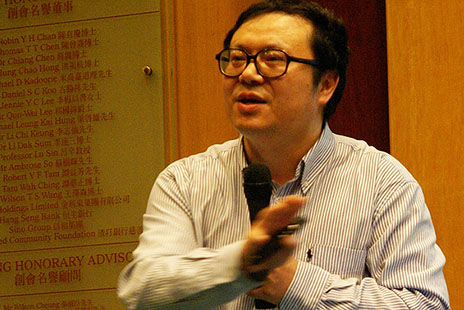THE contrast between unfolding political dramas in Burma and China this year has been striking: on one side of the border, democracy and hope; on the other, corruption, murder, and crackdowns on the internet. In the middle of April, a Chinese netizen went online to ask why China seemed incapable of producing a Gandhi or an Aung San Suu Kyi. The question was addressed to Yu Jianrong, famously outspoken professor of rural development in the Chinese Academy of Social Sciences, who responded dryly that it might better be put to the Central Organization Department. (That department is responsible for keeping the eighty million members of the Chinese Communist Party gainfully employed in running the country.)
As it happened, while Aung San Suu Kyi was out on the campaign trail re-introducing democracy in Burma, Yu Jianrong himself was engaged in drawing up a plan for how to achieve democracy in China. The result was reported briefly in the Western press in late March, not long before the Bo Xilai case began to take up all available room in the media. In a single-page document, posted on the internet as a photo image, Yu set out the steps for a staged transition to constitutional democracy over the next ten years. On 19 April, around six weeks later, the Guangzhou-based current affairs magazine Shidai Zhoukan (Time Weekly) published a long interview with him on this topic, marking the first mention of the document in the Chinese print media.
Yu’s ten-year plan is worth comparing with another online call for constitutional democracy, Charter 08, which in 2009 led to the arrest and imprisonment of Liu Xiaobo. While the fundamental similarities between the two show that he is sailing close to the wind, Yu’s carefully constructed document ultimately stays within the limits of the agenda for change set by Premier Wen Jiabao at the National People’s Congress earlier this year. Charter 08 contains an ambit claim: freedom, equality, human rights, a new constitution, separation of powers, protection for the environment, the whole shebang. Yu’s plan itemises measures necessary to achieve social justice in the first phase of reform (2012–15), and to implement political reforms in the second. His priorities in social justice are clear: rural land rights, social welfare and the reform of the urban–rural household registration system. A second tranch of projected reforms, to the judicial system, would lead to the abolition of the petitioning system and of “education through labour” camps. Only then does he get to free speech. It might be concluded that he has put someone else’s problems ahead of his own.
Interviewed for the New York Times, Liu Yu of Tsinghua University criticised the ten-year plan as “unrealistic,” comparing it unfavourably with approaches in the West where intellectuals “make proposals on specific things,” rather than developing blueprints for the whole country. But it doesn’t require a very close reading of this plan to recognise Yu’s trademark concerns: rural land grabs by local officials; entrenched inequalities resulting from the urban–rural household registration system; and the gross mistreatment of petitioners – people who, for want of other means, seek redress for injustices by appealing to the authorities, and end up in prison, hospital, sometimes even the morgue, for their pains.
It is these issues that have made Yu Jianrong a familiar figure on the virtual horizon in recent years. He is less a democracy activist than a rights activist. Blunt, tenacious and generous, he is well known to at least two types of audience in China. One consists of officials, especially officials at the county level, to whom he often delivers lectures. A professor from the Rural Development Research Institute in the Chinese Academy of Social Sciences is a sought-after commodity for training purposes, and he gets lots of invitations. The second audience, which must include much of the first, is composed of netizens.
Yu Jianrong is not quite up there with the renowned Han Han as a blogger, but his website began hotting up in November 2010 after he posted a comment concerning an encounter with an official in Wanzai county, Jiangxi province. The official had taken exception to comments made by Yu about unlawful demolitions. Online, Yu quoted him as saying: “No demolition, no development. If we officials don’t demolish, what will you intellectuals eat?” A couple of journalists keeping track of blog traffic subsequently reported that the sentence had been re-posted 3000 times within twenty-two hours, eliciting 2000 new strings of commentary.
Wanzai is an agrarian county in the middle of China which it had done well out of rural commercialisation in the 1980s but was left behind during the “get rich is glorious” nineties. Yu had done some homework before he went there, and knew the range of problems he would find there. Rural problems, in his view, can all be traced to the absence of property title, which leaves rural communities helpless in face of local officials colluding with big business to take over their land. Rising conflicts in the countryside are a result, as is a stream of petitioners to Beijing.
On the latter subject, Yu’s due diligence uncovered an unsavoury figure in the person of the party secretary of Wanzai, one Chen Xiaoping (who has since been promoted to a position elsewhere). Chen was on record as having a three strikes policy for petitioners, who are typically peasants heading off to Beijing to complain about local officials: first “offenders” were to be reprimanded and fined; second offenders were to be remanded; third offenders were to be re-educated through labour. This story elucidates the close connection in Yu’s ten-year plan between the petition system and re-education through labour.
Wanzai is not the poorest county in Jiangxi, but like most rural areas it sends large numbers of its young people as migrant labourers to major urban centers. This phenomenon underpins another of Yu Jianrong’s concerns: access by rural migrants to education, health, insurance, and rights in general. The disadvantage of rural migrants in this respect is a legacy of the household registration system, introduced in the late fifties. At that time, urban registration meant access to grain and cotton rations coupons. These were resources which country people were meant to supply for themselves. But it meant, for instance, that during the famine of 1959–61 peasants making their way into the towns were unable to buy grain there, and starved anyway.
The coupon system has long since gone, but there remains a sharp difference between urban and rural people to education and health care entitlements, both because these services are poorly funded in the countryside and because access to well-funded resources in the towns is extremely costly for anyone who is not registered there. The children of rural migrant workers in Beijing, for example, have no natural right to education at a local school. Migrant workers who can pay for a good education for their child here will find all their best efforts to secure a city education frustrated in the end because the child will have to sit for matriculation in the area where the family is registered. For this reason, Yu’s ten-year plan links education to the issue of household registration.
AN INTERVIEW conducted by Taiwanese researcher Chen Yizhong last year shed some light on Yu’s engagement with such issues. The son of a communist party member and minor local official, he was four years old when his father was “struggled into the ground” during the Cultural Revolution. The family was stripped of its precious city registration, and was unable to secure registration in the countryside either. For around eight years, his mother fed her children by foraging. His father was rehabilitated in 1977, but died shortly afterwards. He and his sister travelled “everywhere,” he recalls, petitioning on their mother’s behalf for recognition and compensation for the family’s sufferings. His personal story took a turn for the better when he gained entry to university through competitive exam in 1979.
Such stories are common among the families of officials and intellectuals in the Cultural Revolution, but they do not often produce champions of the poor. One thing that stands out in Yu’s particular saga is the family’s loss of registration papers, which in the bizarre world of revolutionary bureaucracy left them as non-people (fei min), like animals scavenging for a living. He describes the driving intellectual interest of his early years as lying in this problem: understanding the process by which people could become non-people. Disenabling this process is not on the timeline of his ten-year plan, but it would surely be among the effects of its implementation. •




